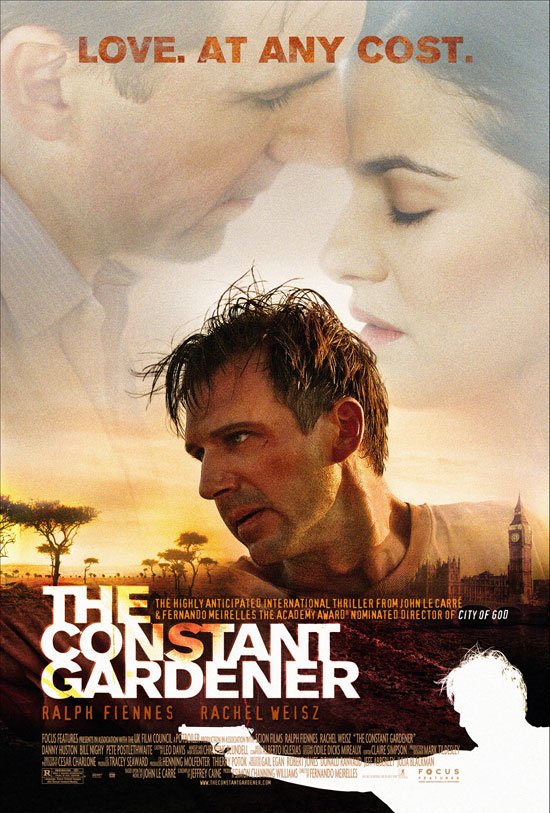Film Review
ĎConstant Gardenerí: Well Acted,
Well Intentioned, Inherently Flawed
By
Alex Holachek (March 23, 2006)
 The Constant
Gardener, released on DVD about a month ago, strives to be an
intelligent romance/thriller with a conscience. Perhaps it attempts
too much.
The Constant
Gardener, released on DVD about a month ago, strives to be an
intelligent romance/thriller with a conscience. Perhaps it attempts
too much.
The film has at its core a well-rendered love story,
told mainly through flashbacks. The marriage of Justin Quayle (Ralph
Fiennes), a likeably timid diplomat, to Tessa Quayle (Rachel Weisz),
a stridently spunky human rights activist, initially seems improbable.
And early in the film, the two expatriates, having taken up residence
in Africa, appear to be downright incompatible.
So when Justin responds to the news
that his wife has been murdered with a nigh-imperceptible lip quiver
as he crushes
a couple of aloe leaves, itís difficult to imagine that the movie will
soon become a redemptive, retroactive falling-back-in-love story that
begins as Justin starts to uncover the reasons for his wifeís puzzling
behaviors.
His initially hesitant search soon develops into an
unsettling dive into the convoluted worlds of diplomacy, big business
and human rights. Fiennes gives a nuanced performance as a man whose
grief enables him to evolve from a quiet and retiring personality to
a quiet and indomitable one.
The conspiracy that he gradually
uncovers involves immoral pharmaceutical trials on defenseless African
AIDs patients,
a premise that would have packed more of an emotional punch if I knew
whether such things actually happened. The filmís scenes of a raid
on a refugee camp in Darfur, however, are undeniably powerful for their depiction
of events that indubitably take place. Such things are certainly easy
to dismiss when one lives the good life here in Falls Church, but rather
more immediate when they are dramatized in front of you.
The
Constant Gardenerís social consciousness, however, is a double-edged sword.
I may be weird, but after watching minor characters in the film killed
by AIDs or senseless violence, I found it hard to be as invested
in the frequently-threatened life of the main character. The extras
dying in the corners of the screen actually commanded more of my
attention because I realized that unlike fictional Justin, they represented
real people.
And therein lies one of the
main dilemmas of the movie. It is beautifully shot, tensely plotted
and Rachel Weisz won an Oscar for her performance, but you (well, I)
felt guilty thinking about such things in the face of the enormous
suffering that edges its way into the film. That reaction is surely
not what director Fernando Meirelles had
in mind.
Even more egregiously, however, this film follows
a pattern that I hated in the rather inferior Nicole Kidman movie The Interpreter, and donít much like now. Namely, a beautiful white
woman shoulders the burden of fighting injustice in afflicted Africa.
Now, I understand that beautiful white women sell Hollywood movies,
but the fact that native African characters are relegated to such minor
roles in movies which should essentially be about them is disturbing.
If all this sounds like a condemnation,
it isnít meant
to be. The Constant Gardenerís conscience
is something that should be celebrated, even if it ultimately weakens
the impact of the filmís great acting and engaging storyline. But then
again, itís just a movie. And as a piece of art and entertainment,
it succeeds.

